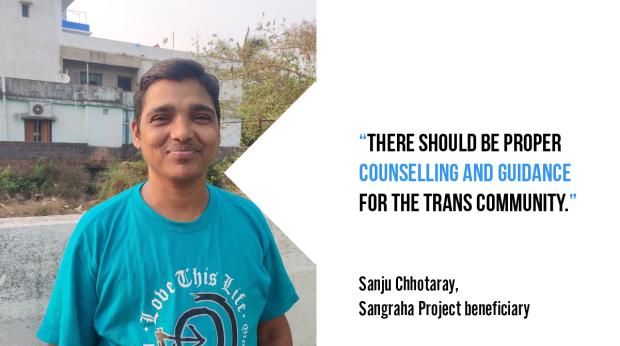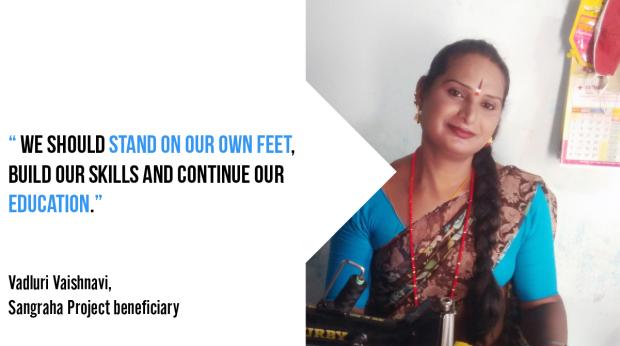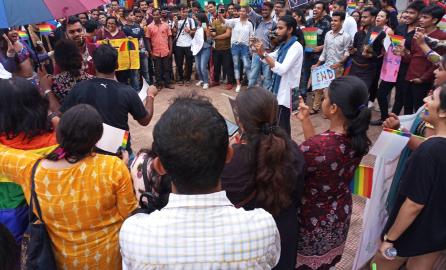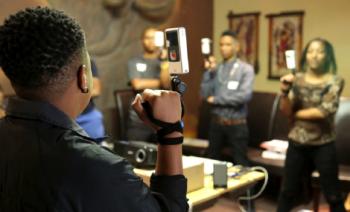In various parts of the world, LGBTIQ people experience serious rights violations and abuses. As of today, 70 States continue to criminalise same-sex consensual relationships. The COVID-19 crisis has only exacerbated such discrimination and violence against LGBTIQ people. The EU integrates LGBTIQ equality in its external policies by funding interventions and working with international and local partners around the world, including India.
The promotion and defence of human rights and democracy are at the heart of EU external action and cooperation1. With the adoption of its first-ever LGBTIQ Equality Strategy 2020-2025 including a chapter on its external action, the EU has prioritised the reduction of rights violations and abuses, and the protection of LGBTIQ rights defenders via a number of instruments such as the Neighbourhood, Development and International Cooperation Instrument (NDICI), the Instrument for Pre-accession Assistance (IPA) and the Asylum and Migration Fund.
LGBTIQ rights in India
Lesbian, gay, bisexual, transgender, intersex and queer people in India are often confronted with stigma, discrimination and restrictions in access to health services due to discriminatory laws and negative social attitudes. For many LGBTIQ, the lack of family or community support increases their vulnerability to violence, unemployment, poverty and homelessness.
To assist in addressing these challenges, the EU Delegation to India has partnered with the NGO SAATHII for the implementation of the EU-funded Project Sangraha: Reducing Violence and discrimination and promoting access to justice for LGBTIQ in India2. The Sangraha project has focused on 11 districts from the states of Manipur, Odisha and Telangana.
SAATHII’s Vice President and Project mentor, Dr L. Ramakrishnan, explains that “the Sangraha project’s approach has centred around three main pillars: skill building, creating links between the LGBTIQ community and the authorities, as well as advocacy and sensitization”.
Lessons learnt from the Sangraha project:
- Capacity-building and information sharing among the LGBTIQ community members can lead to their empowerment.
- Counselling support to families of the LGBTIQ community members and facilitating negotiations with law enforcement can help in the reduction of family violence
- Advocating and engaging with government institutions for social protection and legal services can have a substantial impact on the LGBTIQ community.
1. Capacity-building and information sharing
The Sangraha project – via upskilling – has facilitated justice access for the LGBTIQ community. This has been enabled by the training of 43 community members as Para Legal Volunteers (PLV), with the support of the government State Legal Services Authorities of Manipur, Odisha and Telangana3. These trained PLV members have gained knowledge on various topics such as property rights issues, the Protection of Children from Sexual Offences Act and the Juvenile Justice Act. The PLVs have helped the LGBTIQ communities by reaching out to fellow community members who are facing human rights violations and facilitating their access to legal services.

In addition to capacity building, information sharing among LGBTIQ people has led to their empowerment. The case of Sanju Chhotaray is quite telling. Sanju, a trans man, aged 40, had been experiencing gender dysphoria4 for most of his adolescent and adult life. Despite financial security through his employment as a Data Entry Operator, he did not have access to information on medical interventions for alleviating his gender dysphoria until three years ago. Then, through a chance meeting with SAATHII staff, he learned about the existence of other trans men, and gradually started participating in meetings and capacity-building workshops related to laws, policies and facilities for counselling, hormone replacement therapy and surgery. Consequently, Sanju grew confident in his identity as a trans man and managed to speak to his family members about it.
2. Counselling support to families of the LGBTIQ community members and facilitating negotiations with law enforcement
In an effort to tackle family violence, the Sangraha project focused on counselling support to family members and involving law enforcement in negotiations. The story of Rishi Konsam, a beneficiary of the project, showcases the benefits of counselling, but also highlights the need for supplementary action, such as the provision of shelters.

Rishi Konsam, a gender non-conforming child (assigned female at birth but with masculine gender expression and identifying as a boy), faced physical and emotional harassment by family members. The project team referred the case to the Child Welfare Committee (CWC), Imphal East, a wing of the Government that provides legal support for children in need of care and protection. For a week, the child was given shelter with the President of ETA, a transgender community organisation which SAATHII works closely with. In July 2018, the family members were summoned to the CWC office. Counselling was given to both parents and the child separately. After an explanation on gender nonconformity and transgender issues, the family members understood the magnitude of violence they had perpetrated on their child. They finally agreed to take care of the child and to cease harassment. At present, Rishi is staying with his parents, and has not since faced any violence.
3. Advocating and engaging with government institutions for social protection and legal services
A strategy including sensitization and advocacy activities can bring substantial results. A common issue hindering the progress of LGBTIQ equality across India is the non-implementation of Supreme Court rulings at state and district levels among justice-enabling institutions and government departments tasked with social protection, including welfare schemes and entitlements. Interestingly enough, this situation is often coupled with resistance from locals. According to Apan Moirangthem, a Sangraha project team member, “local stakeholders have limited knowledge of transgender people, the laws, and the verdicts of the country.”

The Sangraha project has facilitated legal gender-identity change for trans-community members. The story of Vadluri Vaishnavi seconds the above. Vadluri, a trans woman, sought assistance in applying for the change of documents, and in accessing schemes. As she had no pre-existing documents affirming her transgender identity, the project team met the local self-government (Panchayat) officers who are entrusted with issuing supporting documents such as proof of residence. The team explained the necessity of changing identity documents in preferred gender and name, by quoting the Supreme Court’s 2014 verdict on transgender rights. Initially, the officials were reluctant to cooperate in the absence of prior documents linking the old and new name and gender to the same person. Persistent advocacy and sensitization efforts by the Sangraha team led the officials to support Vadluri in obtaining the necessary documents. With their support, she obtained a voter identity card and managed to access other entitlements such as a food security card, residential certificate and a PAN (income tax registration) card. A crowning moment for success came when she was able to cast her first vote in the local elections in her true gender identity, as a trans woman.

What’s for the future?
Sangraha project’s approach and key results point to potential focus areas of future interventions on LGBTIQ rights in India. The implementation of Sangraha coincided with the COVID-19 pandemic which reaffirmed the vulnerability of the LGBTIQ community to crises, suggesting the need to enhance resilience and strengthen community capacity for crisis response. Apan Moirangthem, a trans man and also a Sangraha project team member, cites misperceptions around COVID-19 and the LGBTIQ community (such as “transgender people have brought COVID into Manipur from outside”) as a main challenge. Furthermore, other project beneficiaries highlight the issue of lack of shelters (Rishi Konsam) and unemployment (Vadluri Vaishnavi), calling for more investments in education, social security schemes and counselling. To continue empowering the LGBITQ community “there should be proper counselling and guidance” according to Sanju Chhotaray, whereas Vadluri Vaishnavi sends her own empowering message: “We should stand on our own feet, build our skills and continue our education.”
Click on the play button below to watch our video about EU-funded Project Sangraha: Reducing Violence and discrimination and promoting access to justice for LGBTIQ in India.
|
About Project Sangraha
|
Have you been involved in relevant interventions for the promotion of LGBTIQ rights? What was your approach? Did you meet any challenges and how did you address them?
Leave your comment below!
Credit: Video © Capacity4dev | Photo © SAATHII
1 European Commission (DG INTPA): Human development, Peace and governance and European External Action Service: Human Rights and Democracy
2 Solidarity and Action Against The HIV Infection in India (SAATHII) is a secular non-profit organisation that has been working for the past 18 years to enable stigma-free access to healthcare, legal and social welfare services for communities marginalized on account of HIV, gender and/or sexuality in India through community strengthening and coalitional advocacy.
3 In 2009, the National Legal Services Authority (NALSA) brought out a scheme called the Para-Legal Volunteers Scheme which aims at imparting legal training to volunteers ensuring legal aid reaches all sections of people. The Para-Legal Volunteers act as intermediaries between the common people and the Legal Services Institutions. For more information, read here.
4 Distress arising because of incongruence between felt gender and biological sex.




Log in with your EU Login account to post or comment on the platform.